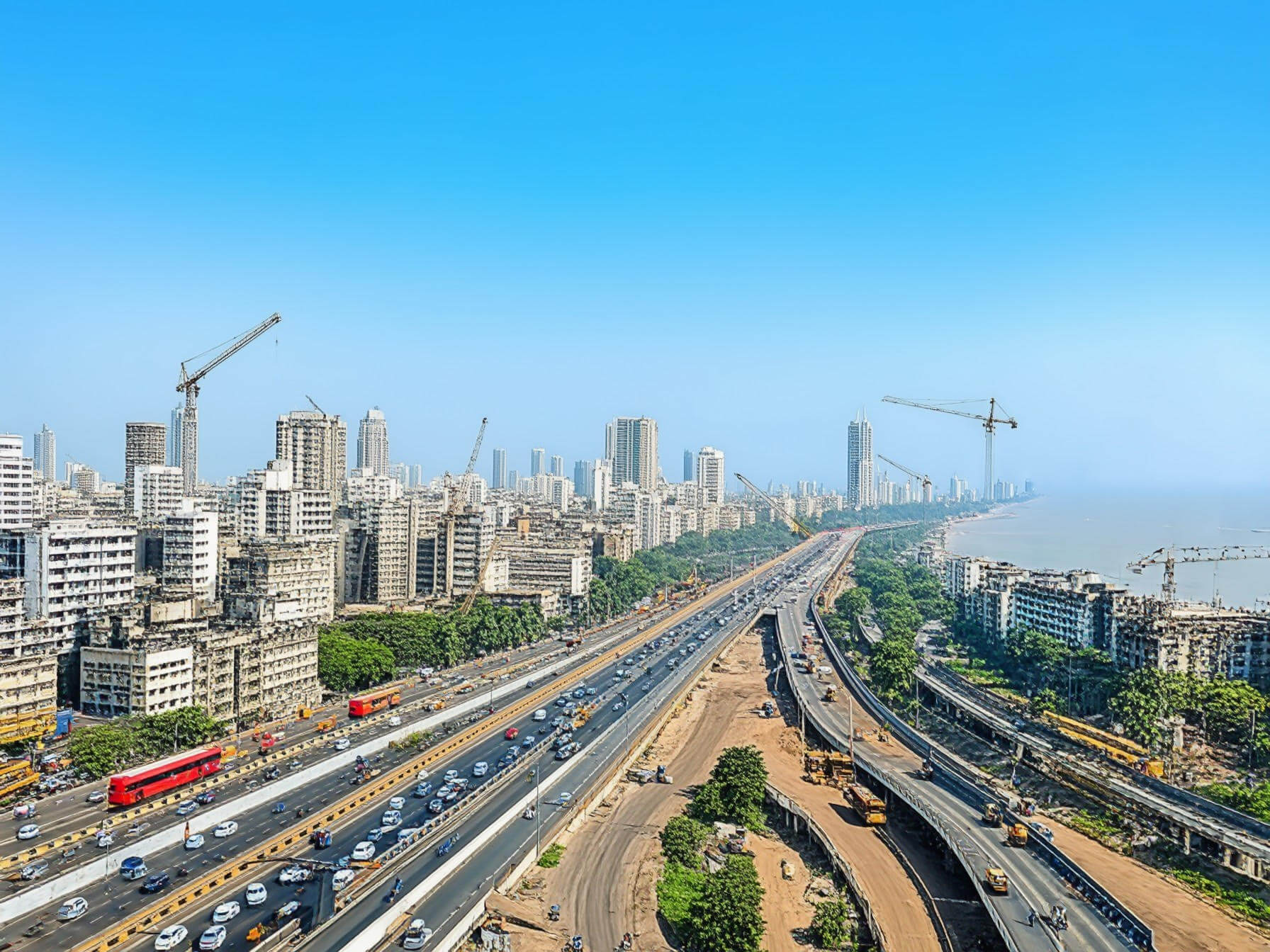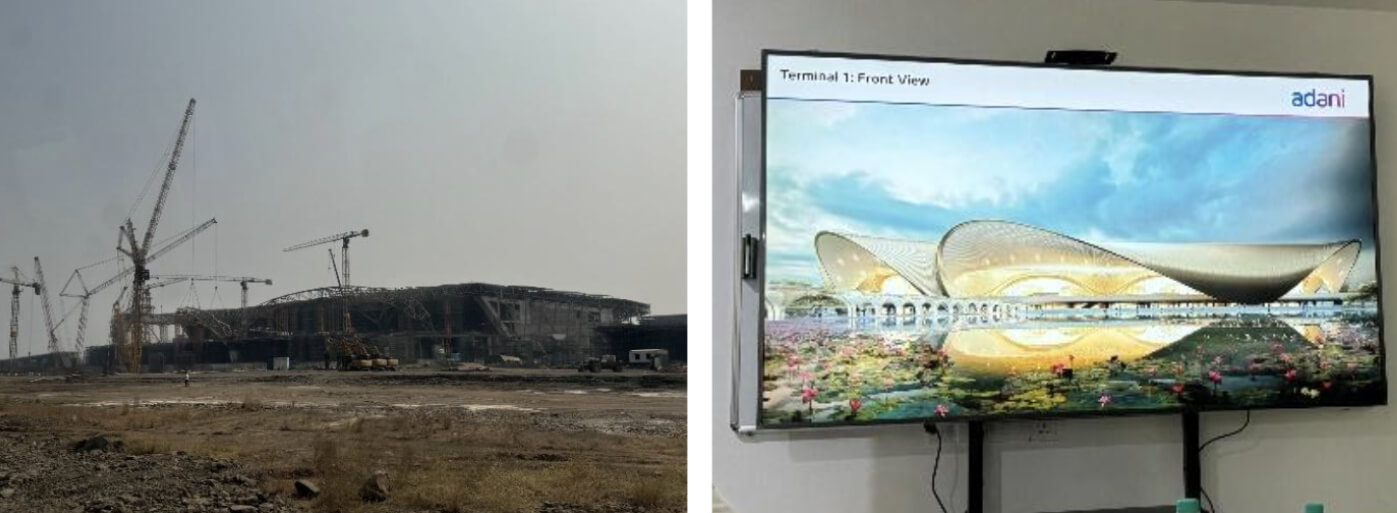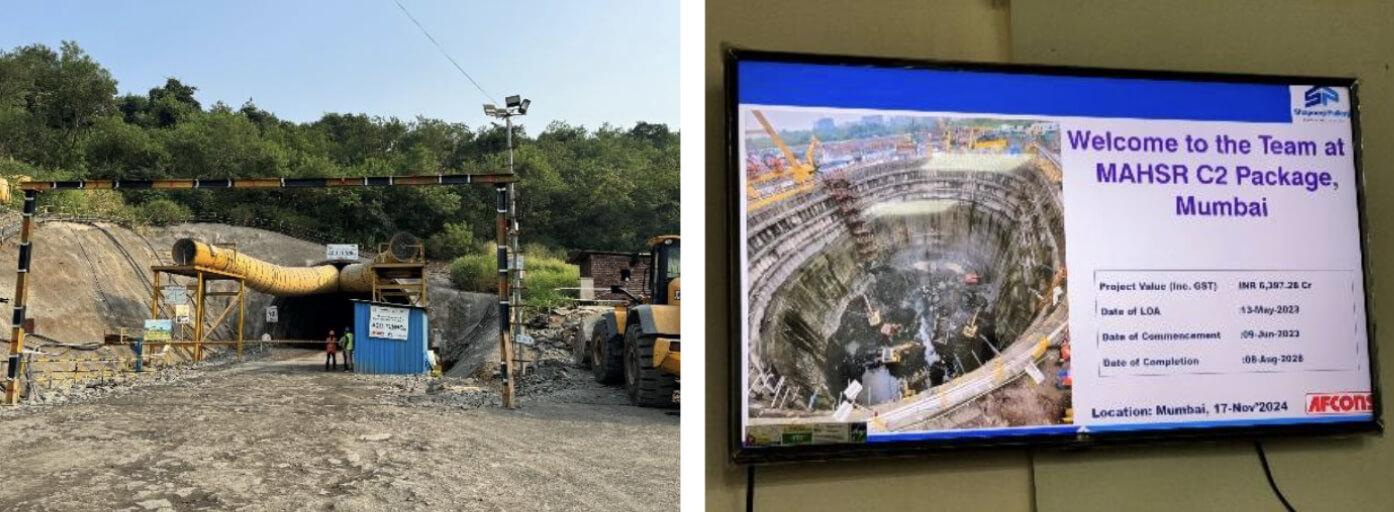
Our Senior Investment Analyst, Marcus Chu, spent some time in India last month, where he met with over a dozen companies and toured manufacturing facilities in Mumbai and Bangalore. His firsthand observations and insights from site visits and speaking with corporate executives paint a compelling picture of India’s accelerating industrial transformation. From bustling construction sites to fully utilized factory floors, the energy and momentum across India’s industrial sector was palpable. Here are the key findings from his journey.
Industrial activity in India is showing robust momentum, and our recent visits to manufacturing sites and infrastructure projects really highlighted this point. Across various sectors, from defense to infrastructure and manufacturing, the energy and activity levels we observed were unmistakably positive, suggesting India’s industrial transformation is well underway.
One of the standout sectors is defense, which remains at the forefront of spending with increased private participation. But it’s not just defense – everywhere we looked, there were major infrastructure projects taking shape. The new Navi Mumbai Airport is under construction, there’s a bullet train project connecting Mumbai and Hyderabad, and multiple highway projects are under construction in Bangalore. On top of that, most flights we encountered were completely full, highlighting the pressing need for expanded aviation capacity.
During our site visit to the Navi Mumbai Airport project, operated by Adani Enterprises, we were impressed by the strategic location and substantial progress in construction. The airport’s modern design not only enhances its aesthetic appeal but also ensures functionality and efficiency in operations. From our observations of the ongoing development, we expect this airport to be a profitable project, benefiting from higher tariff structures compared to existing airports.

In addition to airports, India is making significant strides in modernizing its transportation infrastructure with ambitious high-speed rail projects. The Mumbai-Ahmedabad Bullet Train project, India’s first such initiative, includes sophisticated tunnel construction to maintain high speeds across challenging terrain. A similar project connecting Mumbai and Hyderabad will significantly reduce travel time between these major economic hubs. By enhancing regional connectivity and supporting India’s broader goals of infrastructure modernization, these projects are set to play a pivotal role in driving the country’s industrial momentum and elevating its global competitiveness.

Another observation we made during this trip is that the post-COVID era has marked a notable shift in India’s manufacturing presence on the global stage. Many Indian firms have successfully integrated into international supply chains, capitalizing on competitive advantages such as lower production costs, accessible labor, and a more flexible regulatory environment. This strategic positioning enables these companies to not only meet domestic demand but also to establish themselves as key players in global markets.
A prime example of this trend is TD Power, a leading Indian power equipment manufacturer. The company is experiencing robust growth with a projected 23% CAGR through FY26.1 When we visited their facility, we found it running at full tilt with three shifts daily. They’ve not only dominated their home market with a 90% share in industrial generators but are also making significant inroads internationally, especially into the motor segments in the Middle East.2 We saw similar ambition at Triveni Turbines, which has grown to become the world’s second-largest industrial turbine manufacturer, serving customers in 80 countries.3
The growing global presence of Indian manufacturers appears to be more than just a post-pandemic trend. With strong order books, expanding capacity, and increasing investment in R&D and quality control, these companies are positioning themselves for sustained growth in international markets. Indian companies are no longer just competing on cost, but also on capability.
While construction speed and labor efficiency continue to lag behind Chinese standards, Indian manufacturers are successfully competing through reliable quality standards and supply chain resilience. Site visits revealed effective worker training programs and well-developed industrial ecosystems, particularly in Bangalore.
This was evident at facilities like ABB India, a leading industrial automation and power technology company. During our visit to their facilities in Bangalore, it became evident that the company’s supply chain resilience is a pivotal factor in maintaining its strong market position both domestically and internationally. With a capacity utilization rate consistently between 75-85%, ABB India demonstrates remarkable flexibility in adjusting production to meet incremental market demands without overextending its resources.4 This balance ensures that the company can swiftly respond to fluctuating orders and maintain steady operations even amidst global disruptions – a feature that customers have increasingly prioritized since the pandemic.
Larsen & Toubro (L&T), India’s largest engineering and construction company, is another strong example of this. Managing an INR 5 trillion (~USD 59 billion) order book with 99% active orders,5 the company demonstrates remarkable resilience in navigating supply chain challenges. When Middle East project routes were disrupted, L&T quickly pivoted to source materials from Korea and Japan and established alternative routing through Europe. Despite managing a workforce of 400,000 across various sites and facing some labor shortages,6 the company has maintained project execution ahead of internal estimates, showcasing its ability to maintain operational efficiency even while adapting to supply chain challenges.
This recent trip has reinforced our conviction that India’s industrial momentum is only accelerating. The convergence of massive infrastructure development, expanding manufacturing capabilities, and enhanced supply chain resilience creates a compelling narrative for India’s industrial growth. While challenges remain, particularly in terms of project execution timelines and labor availability, the transformation we witnessed suggests that India is well-positioned to capitalize on the ongoing global supply chain realignment.
The information presented in the material is not and may not be relied on in any manner as legal, tax, investment, accounting or other advice or as an offer to sell or a solicitation of an offer to buy an interest in any investment product or any other entity sponsored or managed by Shikhara Investment Management. This material doesn’t constitute and should not be considered as any form of financial opinion or recommendation.
Shikhara Investment Management LP (“Shikhara”) is currently an Exempt Reporting Adviser that is exempt from registration as an investment adviser with the U.S. Securities and Exchange Commission. This material does not constitute an offer to sell or the solicitation of an offer to buy in any state of the United States or other U.S. or non-U.S. jurisdiction to any person to whom it is unlawful to make such offer or solicitation in such state or jurisdiction.
Investment involves risk. Past performance is not indicative of future performance. It cannot be guaranteed that the performance of the investment product will generate a return and there may be circumstances where no return is generated. Investors could lose all or a substantial portion of any investment made. Before making any investment decision, investors should read the Prospectus for details and the risk factors. Investors should ensure they fully understand the risks associated with the investment product and should also consider their own investment objective and risk tolerance level. Investors are advised to seek independent professional advice before making any investment.
Shikhara’s investment products are suitable only for sophisticated investors and require the financial ability and willingness to accept the high risks and lack of liquidity inherent in Shikhara’s investment products. Prospective investors must be prepared to bear such risks for an indefinite period of time. No assurance can be given that the investment objectives of any given investment product will be achieved or that investors will receive a return of their investment.
Certain of the information contained in this material are statements of future expectations and other forward-looking statements. Views, opinions and estimates may change without notice and are based on a number of assumptions which may or may not eventuate or prove to be accurate. Actual results, performance or events may differ materially from those in such statements.
Certain information contained in this material is compiled from third-party sources. Whereas Shikhara has, to the best of its endeavor, ensured that such, information is accurate, complete and up-to-date, and has taken care in accurately reproducing the information, Shikhara takes no responsibility for the accidental publication of incorrect information, nor for investment decisions taken based on this material. Neither Shikhara nor any of its affiliates makes any representation or warranty, express or implied, as to the accuracy or completeness of the information contained herein, and nothing contained herein should be relied upon as a promise or representation as to past or future performance of any investment product or any other entity.
The contents of this material are prepared and maintained by Shikhara and has not been reviewed by the Securities and Exchange Commission of the United States.
This website is published exclusively for the purpose of providing general information about the management services carried out by Shikhara Investment Management LP, Shikhara Capital (Hong Kong) Private Limited and its affiliates (collectively “Shikhara Investment Management” or “Shikhara”). The information presented on the website is not, and may not be relied on in any manner as legal, tax, investment, accounting, or other advice or as an offer to sell or a solicitation of an offer to buy an interest in any investment product or any other entity sponsored or managed by Shikhara Investment Management. This website doesn’t constitute and should not be considered as any form of financial opinion or recommendation.
Shikhara Investment Management LP is currently an Exempt Reporting Adviser that is exempt from registration as an investment adviser with the U.S. Securities and Exchange Commission and Shikhara Capital (Hong Kong) Private Limited has been approved by the Hong Kong Securities and Futures Commission. This website does not constitute an offer to sell or the solicitation of an offer to buy in any state of the United States or other U.S. or non-U.S. jurisdiction to any person to whom it is unlawful to make such offer or solicitation in such state or jurisdiction.
Investment involves risk. Past performance is not indicative of future performance. It cannot be guaranteed that the performance of the investment product will generate a return and there may be circumstances where no return is generated. Investors could lose all or a substantial portion of any investment made. Before making any investment decision, investors should read the Prospectus for details and the risk factors. Investors should ensure they fully understand the risks associated with the investment product and should also consider their own investment objective and risk tolerance level. Investors are advised to seek independent professional advice before making any investment.
Shikhara’s investment products are suitable only for sophisticated investors and require the financial ability and willingness to accept the high risks and lack of liquidity inherent in Shikhara’s investment products. Prospective investors must be prepared to bear such risks for an indefinite period of time. No assurance can be given that the investment objectives of any given investment product will be achieved or that investors will receive a return of their investment.
Certain of the information contained in this website are statements of future expectations and other forward-looking statements. Views, opinions, and estimates may change without notice and are based on a number of assumptions which may or may not eventuate or prove to be accurate. Actual results, performance, or events may differ materially from those in such statements.
Certain information contained in this website is compiled from third-party sources. Whereas Shikhara Investment Management has, to the best of its endeavor, ensured that such information is accurate, complete, and up-to-date, and has taken care in accurately reproducing the information, Shikhara Investment Management takes no responsibility for the accidental publication of incorrect information, nor for investment decisions taken based on this website. Neither Shikhara Investment Management nor any of its affiliates makes any representation or warranty, express or implied, as to the accuracy or completeness of the information contained herein, and nothing contained herein should be relied upon as a promise or representation as to past or future performance of any investment product or any other entity.
The contents of this website are prepared and maintained by Shikhara Investment Management and has not been reviewed by the Securities and Exchange Commission of the United States or the Securities and Futures Commission of Hong Kong.
The Shikhara logo and name are trademarks of Shikhara Investment Management LP, registered in Hong Kong, the People’s Republic of China (PRC), Australia, the United Kingdom and the European Union and pending registration in the United States.